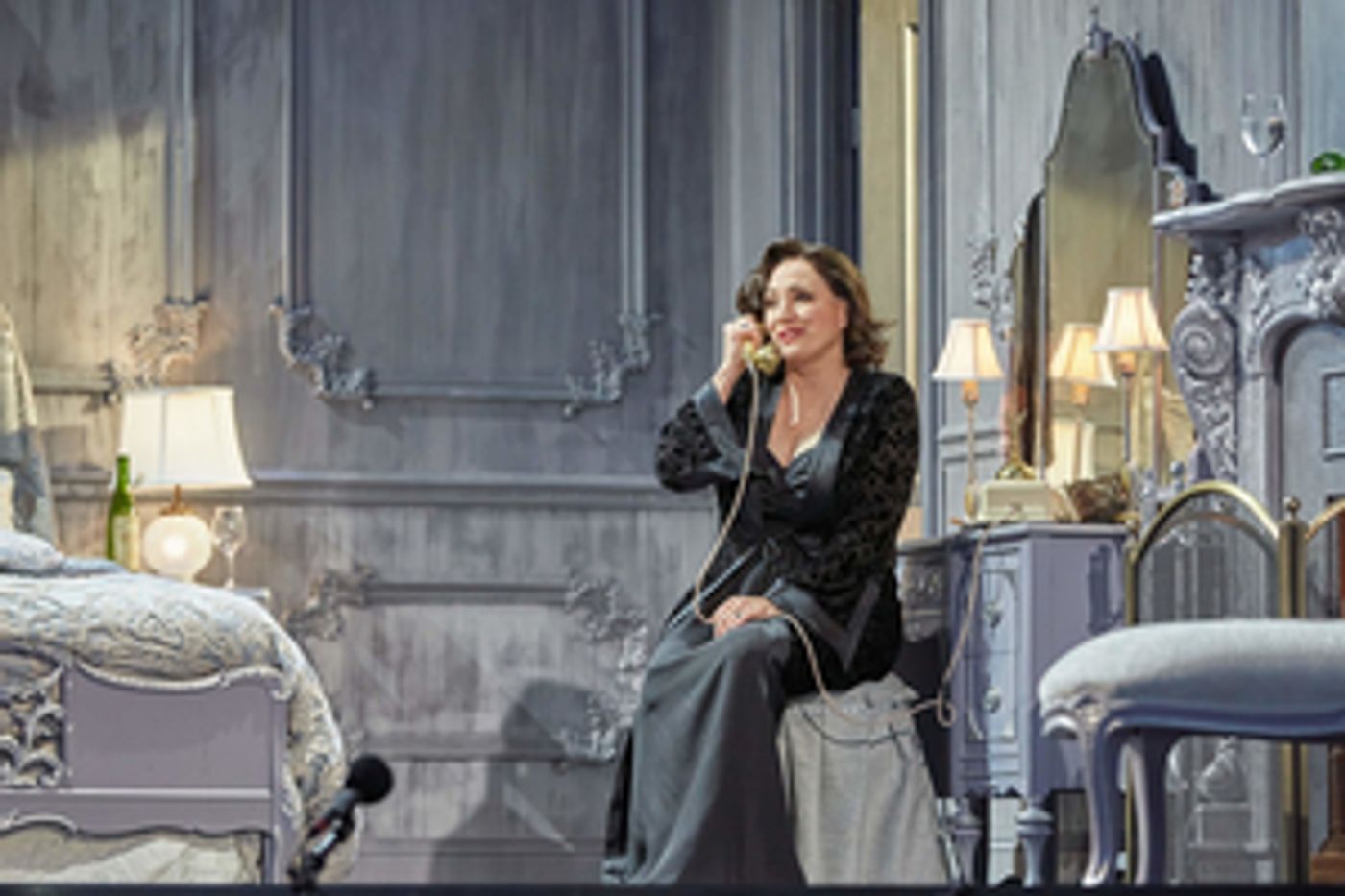Review: LA VOIX HUMAINE Opens At Saint Louis Opera Theatre
Patricia Racette shows such mastery—musically and dramatically. What a voice! It's a joy to hear.

Alone on stage. Alone, alone and desperate. Alone forever. Opera Theatre of Saint Louis and that courageous soprano Patricia Racette bring us Francis Poulenc's one-act opera LA VOIX HUMAINE. It's a solo piece, a true tour de force for the singer. And Ms. Racette carries it off magnificently.
The company's festival is taking place outside this year because of COVID restrictions, but the small theater is quite fully equipped and comfortable.
This lyric drama takes place in the bedroom of a woman we know simply as "Elle". The room that scenic designer Allen Moyer gives her is supremely elegant-in one of those beautiful grand apartment buildings with which George-Eugène Hausmann blessed Paris in his redesign of the city in the latter 19th century. There's a large bed, a skirted dressing table, a chaise longue. There's crown moulding. There's picture-frame wainscotting on the walls. It's a stunningly beautiful room.
And it's all gray. A lovely, soft, faintly glossy, monochromatic gray. It's the gray of solitude. It's the gray of depression.
Large casement windows give us a view of another fine building-or perhaps another wing of this one. We are in Paris. It is evening. A cool, perhaps misty evening.
"Elle" appears. (May I call her "She"? "Elle" is not her name; it's simply what she is.)
So, for Anglophones, "She" appears. She wears black-a black peignoir, a black robe. It's visually striking against the soft gray room. I think she is already in mourning. She is dispondant, clearly. She goes to the large window, opens it, steps up onto the sill. (Will she jump? Is this going to be a really short opera? Ah, no.) The phone rings. She steps down.
"Allô? Allô?"
Now that telephone is a beauty, one of those elegant gold-and-ivory things that sleeps in it's gold cradle. It has a wonderfully long cord. It's a major character in this drama. And it gives the poor lady such frustrations.
It is her ex-lover on the line. She's been waiting for this call. The love affair is over. He knows that. We know that. But She is still in deep denial. He's really called just to arrange for the return of all his love letters. But she continues to insist on how much she loves him.
She lies to him. (No, she did not take too many sleeping pills.) Then confesses that yes, she did, but was saved by her friend Martha. She promises not to lie, then lies again.
There are interruptions. The line fails. She calls his home only to have the butler tell her "Master is not in." (Where is he? Is he with her?) He calls again. Some stranger repeatedly breaks in on the party line. Frustrations!
Through all this Patricia Racette shows such mastery-musically and dramatically. What a voice! It's a joy to hear.
After a while one tends to feel that She should just pull herself together and accept the situation. Such moaning! This is one high-maintenance girl-friend! But that mirror at her dressing table, those huge panels of mirror over the fire-place. Her face is ever before her. There's no way that She can avoid the doom of aging. She is, inescapably, une femme d'un age certain. And she's losing her man to a younger woman. The lens of pathos focuses to a burning point when, learning that he's taking his new love to Marseille, she begs him not to take her to "our little hotel".
In lieu of orchestra, Ms. Racette is accompanied by Sun Ha Yoon on piano. Hers is another heroic performance, as she musically undergirds all the emotion and drama of the story. Now Poulenc never in his life authorized a piano version of this work. He said that "the entire work must bathe itself in the largest orchestral sensuality."
Granted, the piano version does enhance the intimacy of this very intimate opera. But at what cost? The orchestral version is like a fine film score. (Perhaps a Hitchcock?) It follows and amplifies the emotional topography. It's filled with stressful dissonances and with the sweeping strings of romantic memory. That xylophone makes the telephone so real.
But this Opera Theatre production is still an evening not to be missed.
LA VOIX HUMAINE, by Francis Poulenc, with libretto by Jean Cocteau, plays again on June 20 at the Opera Theatre of Saint Louis.
(Photos by Eric Woolsey)
Reader Reviews
Videos

